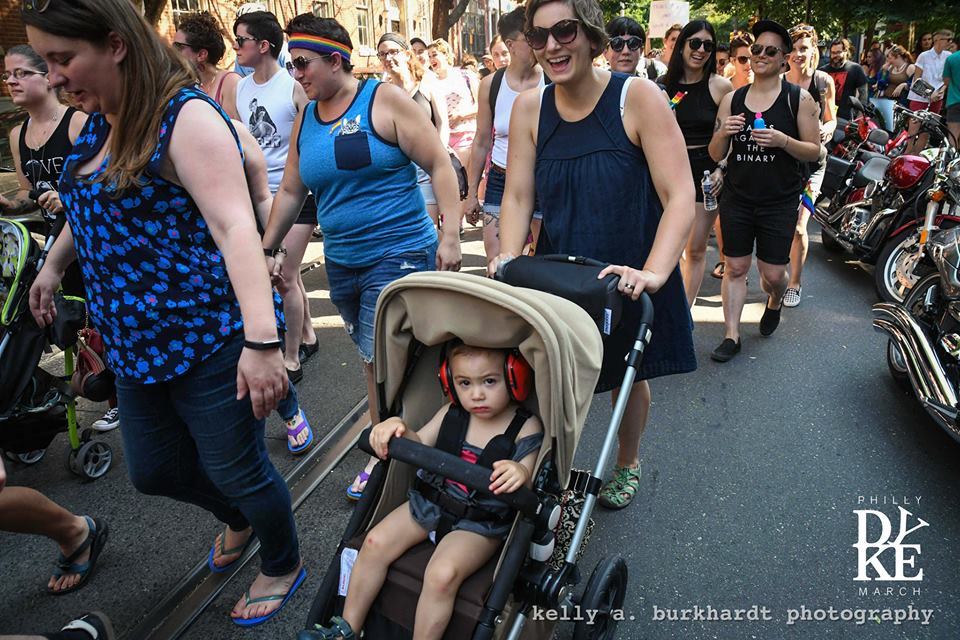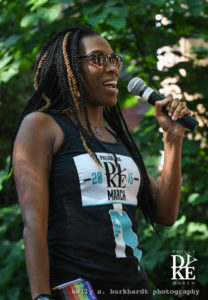Why the Philadelphia Dyke March has staying power
 June 7, 2018
Category: Event, Featured, Long, Purpose, Q&A
June 7, 2018
Category: Event, Featured, Long, Purpose, Q&A
The 20th annual Philadelphia Dyke March is this Saturday.
Jenn Anderson has been involved in the march since she moved to Philadelphia seven years ago and said it’s a social and political experience that exposed her to like-minded queer people in a new city.
Before participants take to the streets, Anderson, who has helped organize the march since the first year she attended, detailed what they’re marching for, how it’s evolved over the years and what being a dyke means.
Her responses have been edited for clarity and length.
###
What is the Philadelphia Dyke March?
It is an annual rally and protest march. The march was started in the mid- to late-’90s as a way to center the voices of those who tend to be marginalized in the LGBT community. Originally, it was a protest to say, “Hey, we’re here. We have a voice. You should listen to us as well.”
Who is the Philadelphia Dyke March supposed to empower?
Our main goal is always to support the voices who aren’t heard. A lot of pride events across the country are predominantly focused on cis white gay males, and I feel like that demographic doesn’t apply to the vast majority of people in the LGBT community.
We keep our stage as a dyke-oriented safe space. The performers that are on the stage at the Philadelphia Dyke March’s rally must be dyke identified. The march is open to anyone. We don’t discriminate based on identity and gender.

The 2017 Philadelphia Dyke March. (Photo by Kelly A. Burkhardt Photography, via facebook.com/philadelphiadykemarch)
What is a dyke?
This comes up in conversation every year. It’s such a firebrand of a term, depending on how you’re looking at it. There are folks that grew up thinking that it was something you would never want to be called. They shied away from it. A lot of the feminist lesbians in the ’60s and ’70s wanted to reclaim the term, so they were proud dykes.
Now, I think that dyke can mean a lot of things to a lot of people. I don’t think it’s any one person’s place to say what that means. Whatever you feel dyke means to you, you’re welcome to claim it. The Philadelphia Dyke March really doesn’t want to police anyone’s identity. It’s a positive thing, to us, to identify as a dyke.
What does being a dyke mean to you?
As someone who identified as a lesbian for quite some time and is flowing around in a queer space now, a dyke conjures up imagery of a radical fighter. What do you fight for — who knows? Is it equality? Is it freedom of expression?
You’re a dyke as long as you have a cause that you’re passionate about, and you’re fighting for it.
How has the march evolved over the years?
This is my seventh year with the march, so I can only speak to the way that I’ve seen the evolution from then. It was a very grassroots event. It was a group of dyke-identified folks getting together.
In the seven years that I’ve been involved, I’ve noticed the march has grown. It’s not just the rally. It’s a lot of community events and a lot more organizing throughout the year, instead of just the few months leading up to the march.
[Other events planned include karaoke nights, the Mr. Philly Drag King competition at the William Way LGBT Community Center and neighborhood clean-ups. Anderson said these events help fundraise and raise awareness for the event.]
On the 20th annual Philadelphia Dyke March Facebook page, the description has a line stating “We do NOT get a permit to take the streets.” Why is that distinction important?
We want people to know that this is not a parade. This isn’t something that we applied to the city to be a parade. Because this is a protest, we won’t get permission to hold the march. We will be in those streets because it’s our right to raise our voices as a protest.
What keeps you coming back to the march?
It’s a group of queer individuals, getting together for this one common goal of organizing a march and making an inclusive space. It’s a lot of intersectionality, and it was the first time that I was able to show up, feel welcomed and really dig in in a group of people with varied life experiences all working toward a similar goal.
For me, I feel very strongly that the personal is the political. Since I found that I had my own voice and I wanted to use it for what I believed in, I felt that the Philadelphia Dyke March really spoke to me in that regard. It’s very important to make sure that if you have a voice, you’re using it in service to causes that are important to you.
Is there anything planned to celebrate this year being the 20th annual march?
I wouldn’t say that we have anything specific planned. But I will say that there is no way that the Philadelphia Dyke March could have carried on through its 20 years without the amazing base and beginnings that we were given by the initial founders back in 1998. These women were some power hitters, like Gloria Casarez. We couldn’t have done it without them and everyone that came after.
I feel that we should keep them in mind. It should be a tribute to them, but it should also be carrying that legacy on and moving forward.
Trending News










